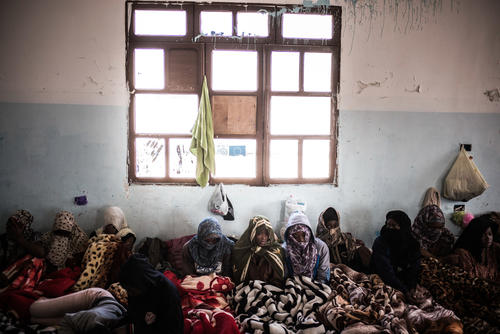Migrants and refugees in Libya are detained arbitrarily and held in unregulated detention centres, where there is no guaranteed access to healthcare. Medical assistance is provided by a handful of humanitarian organisations such as MSF or by UN agencies that manage to have a presence in the country despite widespread violence and insecurity.
Working within a harmful and exploitative detention system, the risk of doing harm is always present, which presents ethical challenges for aid workers. MSF faces a number of dilemmas, regarding issues such as independence of action, access, acceptance, and limitations on the response we can provide to patients’ needs.
Firstly, unrestricted access is highly challenging in prison-like facilities where the provision of medical activities is dependent on consent from the detaining authorities. In a fragmented Libya, some detention centres are more firmly under the control of the Ministry of Interior than others. Armed groups and militias that control territory are de facto in charge of detention centres located in those areas. As power dynamics shift, so does management of the detention centres, which can change rapidly and unexpectedly from one day to the next. This is against the background of blurred boundaries between the authorities and trafficking networks which academics and observers have been reporting on for some time.<a href="https://www.clingendael.org/sites/default/files/pdfs/only_god_can_stop_the_smugglers.pdf">'Only God can stop the smugglers’: Understanding human smuggling networks in Libya, CRU report, February 2017</a>
MSF is obliged to negotiate access to detainees inside the detention centre and must treat patients in the presence of armed guards. Medics are not always given full freedom to triage patients or decide independently which should be seen and treated. In some detention centres, people are concealed from MSF. With no formal registration or proper record-keeping in place, once people are inside a detention centre there is no way to track what happens to them. This makes close monitoring and follow-up of patients extremely difficult. From one day to the next, people can be transferred between different detention centres or moved to undisclosed locations. Some patients simply disappear without a trace.
This has a clear impact on the quality of medical care MSF is able to provide. Our medical teams are concerned by the transmission of communicable diseases inside detention centres – specifically the continual disruption to the administration of medication to patients with tuberculosis (TB). When TB remains untreated or when treatment is interrupted, it can spread and become resistant to drugs. This represents a serious risk to public health both inside and outside the detention centres.
Secondly, when access is granted, there is a risk that MSF could be perceived to be part of the detention system. The presence of MSF staff might appear to cast a veneer of respectability and legitimacy over a system where people are detained arbitrarily without recourse to the law and exposed to harm and exploitation. To avoid this, MSF has publicly called for an end to the arbitrary detention of refugees, asylum-seekers and migrants in Libya, and has denounced European governments’ migration policies to seal off the coast of Libya and ‘contain’ people in a country where they suffer alarming levels of violence and exploitation.
Thirdly, the relevance and effectiveness of MSF’s interventions are limited when the very setting is what is causing the problems medics are seeking to address. MSF is mostly treating detainees for respiratory tract infections, acute watery diarrhoea, skin diseases and urinary tract infections. These are medical problems caused or aggravated by the lack of consistent or adequate medical assistance and the conditions inside detention centres, which are neither humane nor dignified.
Large-scale interventions to address the high rates of skin infections and infestations of scabies, lice and fleas offer only temporary relief as mattresses and bedding inside the detention centres are soon re-infected. MSF refers patients to private hospitals on the condition from the authorities that they are returned to the detention centre upon completion of treatment. Pregnant women who are referred to hospital for delivery must be taken back to the detention centre with their newborn babies.
Arbitrary detention has a direct impact on mental health. People are detained without knowing if or when their ordeal will end. They are anxious and fearful about what will happen to them, and desperate to let their loved ones know they are still alive, but are unable to do so as they have virtually no contact with the outside world. Many patients have suicidal thoughts, difficulty sleeping, display symptoms of post-traumatic stress disorder, and suffer from panic attacks, depression and anxiety. On a regular basis MSF sees patients with psychiatric conditions requiring inpatient care that is often linked to, or exacerbated by, being detained in these circumstances.
An overwhelming number of the refugees, migrants and asylum-seekers detained have already endured alarming levels of violence and exploitation in Libya and during harrowing journeys from their home countries. There are many victims of sexual violence, trafficking, torture and ill treatment. Among the vulnerable are children (sometimes without a parent or guardian), pregnant or breastfeeding women, the elderly, people with mental disabilities or with serious medical conditions. Despite being vulnerable and needing protection, the options to assist them are limited and often there is nowhere safe for them to go.
By delivering primary healthcare in regular mobile clinics and offering lifesaving referral services, our teams are working to improve access to medical care and alleviate suffering. In addition to reaching out to people in distress, MSF aims to raise awareness of the violence and inhumanity of their situation, given increasingly life-threatening European migration policies implemented to contain migratory flows and push people out of sight. However, we will continue to evaluate the situation and assess whether the benefits of our operations in Libya outweigh the shortcomings, while being transparent about the compromises we have to make and the limitations on the medical care we can provide in such difficult and restrictive conditions.

















